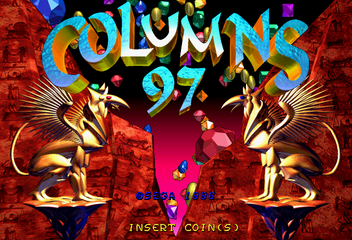Columns '97
From Sega Retro
| Columns '97 | |||||||||
|---|---|---|---|---|---|---|---|---|---|
| System(s): Sega Titan Video | |||||||||
| Publisher: Sega | |||||||||
| Developer: Sega AM1[1] | |||||||||
| Genre: Puzzle | |||||||||
| Number of players: 1-2 | |||||||||
|
This teeny-tiny article needs some work. You can help us by expanding it.
Columns '97 (コラムス97) is an entry in the Columns series, released by Sega for Sega Titan Video arcade hardware in 1997.
Very little has changed in Columns '97 when compared to earlier entries in the series, however predictably the graphics and sound have seen an update. It was included as part of Columns Arcade Collection for the Sega Saturn in Japan.
When the player reaches 2000 jewels and the staff credits disappear, the game switches to Columns 2000, with super fast falling jewels and the background music changed to Ode to Joy.
Sega Logistics Service announced it would end service on the arcade machines on March 31, 2017.[2][3]
Contents
History
Development
The game was developed in only one month[4].
Music and sound
The music and sounds were created by Makito Nomiya, who frequently worked with Sega AM1 and was assigned to this project at the start, rather than near the end of development as was custom for the sound team. He was given 2 instructions by planner Masamoto Morita: for sound effects, Nomiya should create sounds of jewels breaking which could be heard even in a noisy arcade, and for music, he should create soft, quiet music which would change based on the game's progression. For sound effects, he delivered exactly what was asked on his first go, but was asked to create other options just in case. These went unused and the first option was chosen[4].
The game's main theme was intended to change tempo throughout the game based on how close the stack of columns was to the ceiling, just like the original Columns. As a result, it was written with a slow, calming melody which, when sped up to 1.5x, would feel as though it were pushing the player. Hiroshi Kawaguchi, who programmed the sound driver, rewrote it so that this would be possible. During testing, it was discovered that, if the game's test demo reaches the high score table, the game would go silent for 6 hours. It proved impossible for Kawaguchi to fix both issues before the deadline, so the concept of changing the music's tempo was scrapped[4].
Morita also requested that the music change to Ode to Joy after reaching 2000 jewels, as a reference to Evangelion[4][5].
Production credits
- Main article: Columns '97/Production credits.
Magazine articles
- Main article: Columns '97/Magazine articles.
Physical scans
References
- ↑ 1.0 1.1 Sega Arcade History, Enterbrain, page 144
- ↑ File:SegaProductsTerminationAnnouncement 2016-11 JP.pdf
- ↑ File:SegaProductsTerminationAnnouncement 2016-12.pdf
- ↑ 4.0 4.1 4.2 4.3 https://www.wizforest.com/diary/161225.html (Wayback Machine: 2020-08-07 23:53)
- ↑ https://evangelion.fandom.com/wiki/Ode_to_Joy
| Columns '97 | |
|---|---|
|
Main page | Credits | Magazine articles | |
| Games in the Columns Series | |
|---|---|
| Columns (1990) | Columns II: The Voyage Through Time (1990) | Columns III: Revenge of Columns (1993) | Stack Columns (1994) | Super Columns (1995) | Columns '97 (1996) | Hanagumi Taisen Columns (1997) | Columns Arcade Collection (1997) | Columns GB: Tezuka Osamu Characters (1999) | Hanagumi Taisen Columns 2 (2000) | Columns Crown (2001) | Columns Jewel (2005) | Columns Deluxe (2008) | Jewelpet Kira Kira Mahou no Housekibako (2009) | Sega Ages Columns II (2019) | |
| Columns Taisen Mode Tsuki (1991) | Columns (Mame Game) (1997) | Columns (Pocket Boy) (1997) | Columns for Zaurus (2001) | Columns for Clié (2002) | |
| Notably unlicensed Columns games | |
| Magic Jewelry (1990) | Magic Jewelry II (1991) | |
| Super Columns (1990) | |
| L.3.W (1990) | |
| Sextris (1997) | |
| Columns Related Media | |
| Columns・Columns II (1991) | |
| Hanagumi Taisen Columns Official Guide (1997) | Hanagumi Taisen Columns 2 Perfect Guide (2000) | |


